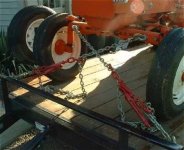A few years back, I bought a new trailer. At that point, I decided to get pro-active in "getting legal" as far as hauling equipment. No more old rusty chains, no more hoping the D.O.T. would like the way I was doing things. I decided to learn the laws pertaining to hauling what I have to haul, then seeking out a Kentucky State Police "Motor Vehicle Enforcment" Officer for his opinion.
What I've learned;
You will get 1000 different interpretations on the laws. Only one or two really matter. (D.O.T. cop and/or judge) Here's what they tell me. If you are hauling a wheeled vehicle THAT WEIGHS OVER 10,000 LBS, USE 4 CHAINS, 4 BINDERS. Also, if that "wheeled vehicle" has an attached implement, OR AN ATTACHED LOADER, they ALSO need SEPERATE chains. If that "wheeled vehicle is under 10,000, TWO chains will do the trick. They need to be properly rated. (Keep in mind, the chains for the loader, and rear mounted implements)
The chains, no matter how many, need to pull forward and to the rear, not allowing any lateral movement. They also need to pull side to side. (45 degree angles from the 4 corners....)
There's OUR interpretation of the written laws, then there's the friendly local D.O.T. Officers interpretation. The cold hard reality is, his is the only opinion that really matters when you're pulled over along a busy interstate. They seem to appreciate you (or me) being interested in following the law. I'd suggest giving them a call, or paying them a visit. Get their take on things. Then, once you've got your tractor loaded and chained down, give them a call. Have an officer stop by your place and take a look at your set-up. It's better to have their critique done in the drive than along that busy interstate.
Another recomendation is to "go over-kill". Get heavier chains than you HAVE to have. Get better load binders than the law requires. Use more chains. Have a heavier trailer with better tires than you absolutely have to have. Make sure your hitch is adaquate. If you appear "MORE THAN SAFE", you might just avoid that "white glove inspection" that usually turns up something wrong. (D.O.T. Officers are "inspectors". In order to justify their very existance, they need to find things wrong when they stop someone)
The law is the law. You can always fight what you percieve as an "un-just citation". It's much better in the grand sceme of things to AVOID GETTING THAT CITATION in the first place.
So, my humble opinion is, get the D.O.T. involved. (Or whatever the local/state vehicle enforcement organization in your area is called....) Let them suggest to you what it takes to maintain harmony.

